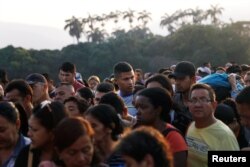Colombian President Ivan Duque says he wants to “put an end to the brutal dictatorship” in Venezuela.
Duque was in Washington Wednesday where he met with President Donald Trump to talk about efforts to drive Venezuelan President Nicolas Maduro from power.
Trump said Venezuela is “in turmoil. People are being treated so badly. I’m not happy about it.”
Trump said he is looking “at all options,” but gave no details. He has said is not ruling out military intervention, but has yet to say under what conditions he would send in U.S. forces.
Monday speech in Miami
The White House said late Wednesday Trump will speak about Venezuela at Florida International University in Miami on Monday. The school is in a neighborhood that has the largest concentration of Venezuelans in the United States.
The U.S., Canada and about 50 other countries from Latin America and Europe recognize opposition leader Juan Guaido as Venezuela’s president.
Support for Guaido
Guaido leads the National Assembly and used the constitution to declare Maduro’s government illegitimate because of a fraudulent election and declared himself interim president.
Trump called Guaido “very brave,” adding, “I think it’s going to work out” with Maduro’s ouster.
Duque said, “We need to give (Guaido) even stronger support to lead Venezuela.”
Trump said Maduro’s refusal to let humanitarian aid, mostly supplied by the U.S., from crossing the Colombian border into Venezuela is “showing bad faith. There are people starving.”
Duque said, “Obstruction of humanitarian aid is a crime against humanity.”
Colombia has taken in the vast majority of the more than 2 million Venezuelans fleeing the chaos, poverty and political violence in their homeland. But the humanitarian aid has been blocked, with Maduro contending that to let it in would lead to a U.S. military invasion.
Guaido said he is “sure that the humanitarian aid will enter” Feb. 23. “We have almost 300,000 Venezuelans who will die if the aid doesn’t enter.”
While Trump has refused to rule out a U.S. military intervention in Venezuela, Congressman Eliot Engel, the Democratic chairman of the House Foreign Affairs Committee, said at the outset of a congressional hearing that lawmakers would not support it.
‘Not an option’
“I do worry about the president’s saber rattling, his hints that U.S. military intervention remains an option,” Engel said Wednesday. “I want to make clear to our witnesses and to anyone else watching: U.S. military intervention is not an option.”
Engel said he appreciates the need for sanctions against the Venezuelan state oil company. But he warned that the White House “must think through the potential repercussions that these sanctions could have on the Venezuelan people if Maduro does not leave office in the coming weeks.”
Elliott Abrams, the Trump administration’s special representative for Venezuela, said U.S. sanctions against the South American nation’s gold, financial and oil markets have “created enormous pressure on Maduro and his band of thieves. We’ve frozen bank accounts, we have revoked visas of those who benefit from their corruption and complicity.”





